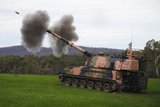Russian Army tests Giatstint-S as precision strike weapon
Russia’s Eastern Military District has held exercises in Amur Region which included the first use of the 152mm Giatstint-S artillery system as a precision weapon for the first time.
The exercise involved 2,000 military personnel and 400 vehicles took part in the drills at Tryokhrechye.
According to the Eastern Military District press office: ‘Crews of the 2S5 Giatstint-S long-range self-propelled guns… conducted test firing, using co-ordinates provided by Orlan-10 UAVs. The test firing was aimed at targets, imitating enemy command centres and other critical facilities of the alleged enemy.’
It continued: ‘Now, it is possible to use powerful ordnance at remote distance with effectiveness of high-precision weapons.’
TASS reported that the use of coordinates from Orlan-10s enabled crews to carry out long-range point artillery strikes with high-precision aiming.
Related Equipment in Defence Insight
More from Land Warfare
-
![World Defense Show 2026: Large vehicles and counter-drone systems take the limelight]()
World Defense Show 2026: Large vehicles and counter-drone systems take the limelight
Visitors who attended the first World Defense Show four years ago continue to speak of the difficulties they faced with poor facilities and power problems. This year’s event emphasised its status as one of the major defence expositions and as a place where regional players and those less welcome at other shows could take centre stage.
-
![MKJ Warrior Series — The Nett Warrior Qualified Connector for Today’s Soldier Systems]()
MKJ Warrior Series — The Nett Warrior Qualified Connector for Today’s Soldier Systems
ITT Cannon’s MKJ Warrior connectors are designed for the harshest environments, delivering mission critical comms, navigation and USB data/power.
-
![Active vehicle protection comes to the forefront as Trophy and Iron Fist secure contracts]()
Active vehicle protection comes to the forefront as Trophy and Iron Fist secure contracts
Experience on the battlefield is accelerating the adoption of active protection systems as technologies continue to evolve to reflect shifting global defence needs.
-
![World Defense Show 2026: Hanwha increases Middle East presence and reveals Tigon 6x6 sale]()
World Defense Show 2026: Hanwha increases Middle East presence and reveals Tigon 6x6 sale
Shephard sat down with Hanwha Middle East and Africa president Sung Il at World Defense Show 2026 to hear about the company’s plans for the region and how it plans to use local industry success to win deals.
























